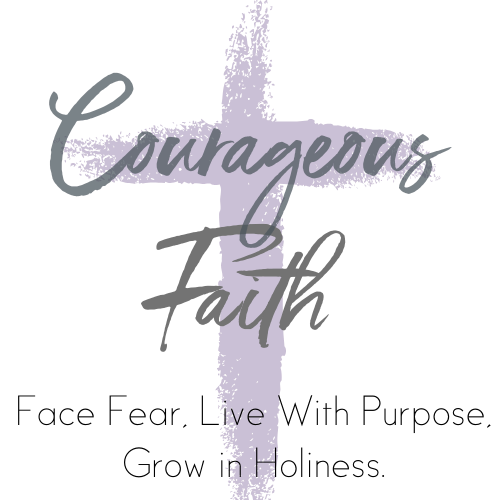
“What is one of your greatest struggles in your faith?” The silence grew uncomfortably loud as I waited for one of the middle school girls to answer the small group question.
I decided to break the ice and share how fear has been my hardest battle. Although I’ve been a Christian for many years, it wasn’t until my forties that I realized my fears were holding me back instead of protecting me. One day, I poured out my heart to the Lord and begged God to help me stop being so afraid of everything. I was afraid of what people thought of me, afraid of driving on the freeway, flying by myself, making mistakes, and using my gifts to serve the Lord. When I made a decision to face my fears, I began to experience the reality of God’s presence and love for me, firsthand. I started a small group, created my own website to pursue my love for writing and share my faith, drove on the freeway to places I never thought I could, flew by myself for the first time, went to counseling, and ran my first half-marathon.
Across from me, a young lady leaned forward in her chair and raised her hand, slightly, to share. Quivering courage overcame caution as her faint voice became vulnerable, and I pressed in to meet it halfway.
“I’m afraid of everything. Everything you’ve been afraid of, too. I’m even afraid of God.”
I held back my impulse to get up and hug her as if she was the teenager I used to be—the insecure girl afraid of doing the wrong thing and ruining her life.
It can be difficult to understand how the word fear is meant when the Bible tells us to fear God. We associate the word fear with anxious feelings that something bad is going to happen to us. In order to understand its distinction, we must look to the Word of God for answers.
I’ve researched the fear of the Lord in scripture for over six years to answer my own questions about why God tells us not to be afraid but wants us to fear him. What does that mean? Why did the appearance of God and angels elicit fear and sometimes terror in those who witnessed God’s presence? Why did I still feel afraid during my greatest moments of faith? What does it mean to fear the Lord, and how do you do it?
I looked up every word in the Bible that mentioned the words fear, afraid, or anxious. Every verse about fearing the Lord always draws a believer into a loving, trusting relationship with God. It causes us to want to run to the Lord, bow down before him, and surrender our lives to him.
Distinguishing the difference between natural, human fear (which is meant to protect us from harm), the spirit of fear, and Godly fear helps us understand what the Bible means when we read we are to fear God.
In 2016, a wildfire (the Rough Fire) threatened to burn down one of my favorite places—Hume Lake Christian Camp. Hundreds of people changed their Facebook profile pic to “pray for Hume.” And by the grace of God, when all hope seemed lost, God did a miracle. Firefighters set a controlled burn to eliminate the fuel in the path of the wildfire. God used a backburn to save Hume Lake.
Just as fire can be both destructive and helpful, I learned to distinguish how fear can be both destructive and helpful. There is a difference between natural human fear that’s meant to protect us from danger versus the spirit of fear that holds us back from fulfilling God’s purpose for our lives. Sometimes that helpful instinct to protect us from danger crosses the line and becomes destructive.
The kind of fear that controls your life is referred to in the Bible as the Spirit of Fear. The spirit of freedom is the opposite and is found in the Holy Spirit through a relationship with Jesus Christ. The moment someone confesses Jesus is Lord and becomes a Christian, he/she receives the free gift of the Holy Spirit living inside them. Learning to fear the Lord unleashes the power of the Holy Spirit in your life to help you overcome the kind of fears that keep you captive.
Fearing the Lord unleashes the power of the Holy Spirit to work in the life of a Christian. Share on X
“For God gave us a spirit not of fear but of power and love and self-control” (1 Timothy 1:7, emphasis mine).
The spirit of fear causes us to run away from God. It traps and keeps us captive in our own perceived, protected safety net. When we fear the Lord, we allow the Holy Spirit to change us and help us live in obedience to the Word of God. Sometimes this means facing our fears and learning to walk through feeling afraid. Then we learn how to trust and fear the Lord more than our own fears.

Every time the Bible refers to the fear of the Lord, it’s always meant for our good. Share on X
“The fear of the Lord leads to life;
then one rests content, untouched by trouble” (Proverbs 19:23).
“The fear of the Lord is pure, enduring forever” (Psalm 19:9)!
Fearing the Lord gives us strength and confidence!
Fearing the Lord becomes our strength as we take scary steps of faith. The fear of the Lord is our equipping power to face the unknown and gain peace from knowing that God is always in control.
When we fear the Lord, we begin to experience God’s power working through our weakness and becoming our strength when our strength is gone.
“In the fear of the Lord there is strong confidence” (Prov. 14:26).
Boldness comes as a result of living in dependence upon God. As we live our lives in Christ, He produces godliness and the assurance of His continual presence and help in every situation we face.
“Let us then with confidence draw near to the throne of grace, that we may receive mercy and find grace to help in time of need” (Hebrews 4:16 KJV, emphasis mine).
Fearing the Lord brings freedom to believers, not captivity.
“For the Lord is the Spirit, and wherever the Spirit of the Lord is, there is freedom” (2 Corinthians 3:17 NLT).
Proper fear of the Lord creates humble adoration and reverence that leads someone to love their Creator and want to live for him.
One example of fighting fear with the fear of God can be seen in Exodus when the Lord used Moses to instruct the Israelites in how they should obey the Lord when God’s presence came down on Mt. Sinai to speak the 10 Commandments. God would not allow the Israelites to enter his holy presence or else they would die. The Israelites were given strict instructions to get physically and spiritually ready to hear God voice the 10 Commandments.
“When the people saw the thunder and lightning and heard the trumpet and saw the mountain in smoke, they trembled with fear” (Exodus 20:18 NIV).
“Mount Sinai was covered with smoke, because the Lord descended on it in fire. The smoke billowed up from it like smoke from a furnace, and the whole mountain trembled violently. As the sound of the trumpet grew louder and louder, Moses spoke and the voices of God answered him” (Exodus 19:18-19).
“When the people saw the thunder and lightning and heard the trumpet and saw the mountain in smoke, they trembled with fear. They stayed at a distance, and said to Moses,“Speak to us yourself and we will listen. But do not have God speak to us or we will die” (Exodus 20:18-19).
The people knew God was so holy that they couldn’t even handle him speaking directly to them, let alone see him with their eyes. Then notice what Moses says to them:
“Do not be afraid. God has come to test you, so that the fear of God will be with you to keep you from sinning.’ The people remained at a distance, while Moses approached the thick darkness where God was” (vs. 20-21, emphasis mine).
Moses told the Israelites not to be afraid but to fear the Lord.
The fear of the Lord was meant to help them obey the Lord and keep them from sinning. Moses told them not to have the kind of fear that makes them run away from God (the spirit of fear) but instead to have reverent fear that worships and honors God through obedience (the fear of God).
The Bible mentions two different kinds of fear. One fear might be referred to as abject or “slavish” fear because it causes us to be enslaved by it and run away from God. The other fear is “reverential” fear and causes us to worship God in awe and adoration. When the Bible refers to “the fear of the Lord” it means having deep respect and reverence for God’s authority and power.
The Hebrew word for fear is yare, (Strong H3372) and it carries a number of meanings. There is both the definition of being “terrified” along with the definition of having “reverence” and “awe.”
The Greek word for fear is Phobeo (Strong G5399). It, too, carries similar meanings with references to “being afraid” and “having reverence or awe.”
There can still be an element of being afraid in reverential awe and reverence for God. At Mt. Sinai, the awesome display of light and sound was necessary to show Israel God’s great power and authority. Only then would they listen to Moses and Aaron.
Adam disobeyed God’s instructions to not to eat from the tree of the knowledge of good and evil. When Adam and Eve heard the sound of God walking in the garden, they became terrified and hid. When we feel the separation of our sin compared to the holiness and glory of God, without the atonement of Jesus for our sins, phobeo fear is an appropriate response.
“It is the essence of impiety not to be afraid of God when their is reason to be afraid of God. ” John Murray
“This kind of fear is right and proper in every situation where our condition leaves us exposed to the righteous judgements of God. Is it right to be afraid of God? Yes, if you have biblical grounds to be afraid of him” (The Forgotten Fear of God p. 33).
“That which lies at the root of this fear is some comprehension of the character of God as holy and just. Because He is holy. Because He is passionately opposed to all sin. It is the recognition of who God is as a holy and just God and, consequently, how He regards sin” (p. 34).
By God’s loving grace he sent his son Jesus to bridge the gap and save us from what our sins deserve. In Luke 12:4-5, Jesus says,”My friends, do not be afraid of those who kill the body, and after that have no more that they can do. But I will show you whom you should fear: Fear Him who, after He has killed, has the power to cast into hell: yes, I say to you, fear Him!”
Although the recognition of our sin should bring us to our knees, we are not meant to wallow in guilt and shame. Christ came to set us free. Godly fear produces humility and worship, not fear that creates lingering terror or that controls us. Instead it bids us to come, confess the sin that separates us from a holy God, and find cleansing grace through the blood of Jesus Christ.
The fear of the Lord is pure
Psalms 19:9 says tells us the spirit of the Lord is pure and endures forever. In the Bible, whenever God’s holy presence created natural fear, the next words written were always, “Don’t be afraid.” God doesn’t want us to be afraid. We can’t look upon the glory of God as limited, sinful beings without being amazed and even scared because of the magnitude of his power. Still, our fear of God is a wholesome, healthy fear that produces reverence and awe for his majesty and dispels the spirit of fear. 1 John 4:18 says perfect love drives out fear.
Godly fear causes us to be in awe of the majesty of God.
This natural response to the holiness of God is also seen during the transfiguration of Christ.
Peter was allowed a deeper understanding of the deity of Christ when God incarnate shone like the sun as Jesus’ clothes became as white as the light. The unfiltered glory of God was displayed to Peter.
…a bright cloud covered them, and a voice from the cloud said, ‘This is my Son, whom I love; with him I am well pleased. Listen to him!’ When the disciples heard this, they fell facedown to the ground, terrified. But Jesus came and touched them. ‘Get up,’ he said. ‘Don’t be afraid.’ When they looked up, they saw no one except Jesus. ~Matthew 17:5-8
Witnessing the transfiguration of Christ became a faith marker for Peter during his journey with Jesus. He recalls it in 2 Peter 1:16-21:
For we were not making up clever stories when we told you about the powerful coming of our Lord Jesus Christ. We saw his majestic splendor with our own eyes when he received honor and glory from God the father. The voice from the majestic glory of God said to him, “This is my dearly loved Son, who brings me great joy. We ourselves heard that voice from heaven when we were with him on the holy mountain.
The evidence of God’s great love for us is that He sent His only son, Jesus Christ, to take on the constraints of a human body in order to be the bridge that covers our sin so we can enter into the Holy presence of God with confidence.
It may seem like it’s difficult to understand what it means to fear the Lord. However, fearing the Lord is not an elusive concept. Scripture paints a picture and shows us what fearing the Lord looks like in the life of a believer, how we are capable of it, and the results it produces.
We can learn how to fear the Lord and teach our children to fear the Lord.
Only be careful, and watch yourselves closely so that you do not forget the things your eyes have seen or let them fade from your heart as long as you live. Teach them to your children and to their children after them. Remember the day you stood before the Lord your God at Horeb, when he said to me, “Assemble the people before me to hear my words so that they may learn to revere me as long as they live in the land and may teach them to their children.” ~Deuteronomy 4:9-10
In order to understand what it means to fear the Lord, we must fervently seek to know God.
My son, if you accept my words and store up my commands within you,
turning your ear to wisdom
and applying your heart to understanding—
indeed, if you call out for insight
and cry aloud for understanding,
and if you look for it as for silver
and search for it as for hidden treasure,
then you will understand the fear of the Lord. ~Proverbs 2:1-5
The fear of God ought to result in total commitment to him.
Those who fear the Lord will obey the Lord and serve him with all their heart and soul.
Deuteronomy 10:12-13 gives some great examples of what fearing the Lord looks like in our lives.
And now Israel, what does the Lord your God ask of you but to fear the Lord your God, to walk in obedience to him, to love him, to serve the Lord your God with all your heart and with all your soul, and to observe the Lord’s commands and decrees that I am giving to you today for your own good. (Emphasis mine.)
The last three words in verse 13 are a great summary as to why the Lord tells us to fear him—for our own good. When God tells us not to be afraid, but to fear him, we must understand his heart behind giving the command. God wants us to allow the Holy Spirit to move through our lives so we can access His power that gives us courage, helps us love others, and be self-controlled. When we learn what it means to fear the Lord, we’ll get to know the loving character of God who wants to draw us to himself, love us, calm our earthly fears, and protect us from evil.
God inspires us to fear Him.
Although we can learn to fear the Lord, it is God who enables our hearts to be stirred by the Holy Spirit to the truth of God as we willingly surrender our lives to Him.
“And I will make an everlasting covenant with them, that I will not turn away from them, to do them good; but I will put my fear in their hearts, that they shall not depart from me” (Jeremiah 32:40 KJV).
As I learned more about why God wants us to fear Him, I found many Bible verses that directed me to know how to fear the Lord more than my own fears. Stay tuned for more posts about the many blessings and benefits fearing the Lord brings into our lives.
I would love to know if this post helped you better understand the fear of the Lord. What questions do you have? Are you interested in learning more about how fearing the Lord helps you fear less? Let me know in the comments.
I’ll be publishing more posts about how fearing the Lord helps us fight fear and learn to trust in God. If you want to get recent posts as soon as they publish you can join my Courageous Faith newsletter here. Subscribers also gain access to my free library filled with resources to help you face fear.










 Hello there! I'm Valerie, a mom of four and wife of 27 years. My writing inspires others to cultivate courageous faith and find solace in trusting God, especially in moments of fear and uncertainty. Join me on this adventure as we explore the beauty of trusting God when we are afraid.
Hello there! I'm Valerie, a mom of four and wife of 27 years. My writing inspires others to cultivate courageous faith and find solace in trusting God, especially in moments of fear and uncertainty. Join me on this adventure as we explore the beauty of trusting God when we are afraid. 




I always thought of it as respect or reverence for Him. I can’t understand defying Him or being in rebellion as many people are.